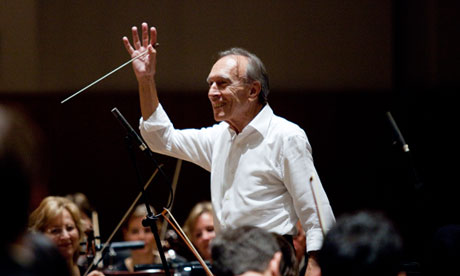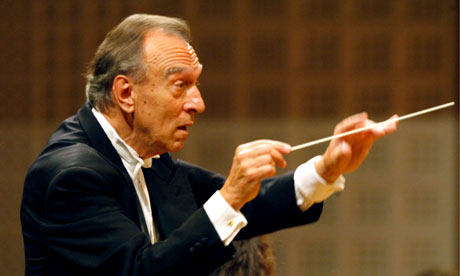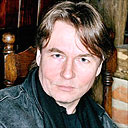Conductor Claudio Abbado has been working on his garden in north-west Sardinia for 40 years. "When I moved here, the only thing here was that bougainvillea," he says, pointing to an outrageous explosion of purple just above his house. "And every year, we build something more, we plant something more." Abbado's land cascades down a steep slope into the Mediterranean, and you have to negotiate a series of crazily angled wooden walkways, designed by him, to get to his beach and the pier for his yacht. Underneath an awning on the pontoon, a gigantic banner proclaims "Venezuela", a gift from the young musicians of the Simón Bolívar Orchestra. Abbado regularly goes to work with the students of El Sistema in Caracas, the talismanic scheme set up by José Antonio Abreu - "a saint", Abbado says.
This house on Sardinia is his refuge, a place where the 76-year-old conductor prepares the handful of programmes he now performs every year. His schedule has been greatly reduced after his battle with stomach cancer in 2000 - the severity of which meant he had half his intestines removed. He lost the youthful, black-haired glamour familiar to music-lovers and became a shocking, spectral presence. Abbado eats a special diet - "I have to make sure I eat something little every two hours, and I must have nothing fried" - and he holds his belly protectively when he talks about his illness, but now, a few years on, he is stable and improving, and at home in Sardinia is relaxed, jovial and energetic. "It's the music that gives me energy," he says.
When cancer struck him, Abbado was chief conductor of the Berlin Philharmonic, having been elected Herbert von Karajan's successor to conduct the world's most famous orchestra in 1989 (he held the post officially until 2002, when Simon Rattle took over). Before that, he had held the most important musical jobs in Europe, but only after he had built his reputation over many years. Born into a family of musicians and academics in Milan in 1933, Abbado studied composition, piano and conducting at the Giuseppe Verdi Conservatory in Milan; the year after he graduated, he won a conducting competition in America, and made important debuts in Vienna and La Scala. But Abbado then shunned the limelight and honed his musicianship by teaching chamber music in Parma for three years. After this self-imposed isolation, his career took off, and he quickly became one of the most important musical presences in the world. He was in charge of the opera of La Scala in Milan for nearly two decades, from 1968-86; and he ran the London Symphony Orchestra from 1979 until 1988, when he left to become music director of the Vienna Staatsoper. Then came his job with the Berlin Philharmonic.
The transformation from those "crazy times" to the relative calm he enjoys today is something he relishes. "I have more time to study, to prepare now." But would he have made this change without his illness? "Probably not. But I have to change to survive. And it means that when I study now, I go deeper. For example, Mahler's First Symphony, which I have conducted many times - I bought a new edition, and I found a lot of new things."
Abbado does his studying on his Sardinian estate of floating walkways and plants, in a little flat underneath the main house. Next to a particularly spectacular crop of camellias, a high-ceilinged room accommodates his bed, library and work desk. Nearly the whole perimeter of the room is taken up by Egon Schiele prints - tortured, fragile images that symbolise the time and place that has fascinated Abbado more than any other: turn-of-the-century Vienna, the city of Brahms, Bruckner, Schoenberg, Berg and, above all, Mahler.
It was with Mahler's Second Symphony that Abbado made his debut with the Vienna Philharmonic in 1965, when, aged 32, he was invited by Karajan to conduct the orchestra at that year's Salzburg Festival (he recalls his teacher in Vienna, Hans Swarowsky, one of the century's great conducting pedagogues, ironically complimenting him after the performance, "Ah look, the new Toscanini!"). Mahler's Sixth was on the programme when he founded the European Community Youth Orchestra in 1978; the high point of his time with the LSO was the festival Mahler, Vienna, and the 20th Century; and another performance of Mahler's Second was the climax of his inaugural programmes with the Lucerne Festival Orchestra, which he founded in 2003.
Abbado has talked of the choral finale of the Second Symphony - the "Resurrection", Mahler's coruscating vision of spiritual rebirth - as a metaphor for his own musical experience. Among Mahler's text for that movement are the lines: "What was created, must pass away / what passed away, must rise! / Cease to tremble! / Prepare yourself! / Prepare yourself to live!" Abbado sees this as meaning that music is both destroyed and redeemed by its temporality: it exists and is extinguished in a moment, but has the endless possibility of being created anew in time. But in the context of Abbado's recovery from illness, it's impossible not to hear the personal resonance: it was his own rebirth he was celebrating in those performances, in the company of the players he handpicked to play in the Lucerne Festival Orchestra's first concerts.
Six years on, and Abbado is continuing the cycle of Mahler symphonies he is building, year by year, in Lucerne. The score of the Fourth lies open on his desk, a well-worn copy ornamented with his pencil marks, the aides-mémoire he will use in rehearsals. Startlingly, there is no piano, or any other instrument, in his work room. "I don't need one," he says. Instead, Abbado hears all the music he conducts in his head, working through tiny details of interpretation in his imagination, building up a piece harmony by harmony, phrase by phrase, line by line. He conducts everything he performs from memory. How does he learn these huge symphonies or operas? "There comes a point where I know I have memorised a piece. But it's psychological as well. If I don't know a piece by memory, I don't know it well enough."
The Lucerne orchestra is the embodiment of a lifetime's dream: to create the ideal conditions for symphonic music-making. Its roots can be found in the orchestras that Abbado has founded throughout his career. In parallel with his starry appointments with La Scala and the London Symphony, he has set up a series of youth orchestras and bespoke ensembles that are among his greatest achievements, and will be the cornerstones of his legacy. As well as inaugurating the European Community Youth Orchestra in 1978, he was behind the extension of the catchment area of the Gustav Mahler Jugendorchester to include Eastern Europe and Russia in 1986. He was one of the founders of the Chamber Orchestra of Europe, and when the first generation of players from the Gustav Mahler orchestra got too old to be classed as "youths", Abbado set up the Mahler Chamber Orchestra to accommodate them. Now he has Orchestra Mozart, another chamber orchestra of mostly young musicians, based in Bologna. All of these ensembles are founded with different values from those of a conventional orchestra. The central philosophy is of listening - the gift he tries to give his musicians, his audiences and his family. "My grandfather used to take me for walks in the mountains," Abbado remembers, "and he didn't say very much. I learned from him to listen to silence. And for me, listening is the most important thing: to listen to each other, to listen to what people say, to listen to music."
In Lucerne, that principle is extended to the scale of a full-size symphony orchestra. It's a 120-strong ensemble made up of musicians from the Mahler Chamber Orchestra who are supplemented by dozens of principal players from Europe's great orchestras and chamber ensembles - the Berlin and Vienna Philharmonics, the Alban Berg and Hagen Quartets, and solo virtuosos like clarinettist Sabine Meyer and cellist Natalia Gutman. Abbado can hardly believe his luck in having got this ensemble off the ground. "It's so wonderful: we are all friends, and they are the best players from each orchestra, from each nation, from each capital city. If you think, there are seven or eight principal cellos in the cello section, there's Wolfram Christ, who used to lead the violas in the Berlin Philharmonic, and Alois Posch, who was principal double bass with the Vienna Philharmonic - amazing. And I don't know how many leaders there are in the first violins." During rehearsals last year, I counted: there were nine.
What you hear in the Lucerne orchestra's concerts is symphonic repertoire played with the refinement and subtlety of chamber music. The orchestra's virtuosity of listening is miraculous: the way that each of the players knows instinctively what their role is in a gigantic Mahler symphony, when they have a solo, when they need to accompany another player, and how they need to blend in a chord. Viola player Diemut Poppen has worked with Abbado every year since the founding of the European Community Youth Orchestra, and now sits on the front desk of the violas in the Lucerne orchestra. "We all know what he wants. And he is able, through his gestures, to communicate to every single person in the orchestra the meaning of the music. Too many conductors work on details all the time but never get to the root of what the music means. With this orchestra, we get closer to the music's meaning, to where it comes from, because of Claudio's incredible sensitivity. It's almost a mystical thing: some kind of collective energy is formed, where everybody has the same imagination and the same concentration." But Abbado's softly-softly rehearsal technique has not always endeared him to orchestral players. Clive Gillinson, ex-cellist and managing director of the LSO during Abbado's directorship, and now executive director of Carnegie Hall in New York, says that "he basically doesn't say anything in rehearsals, and speaks so quietly, because he's so shy, so people can get bored. But it works because everyone knows the performances are so great. I've never known anybody more compelling. He's the most natural conductor in the world. Some conductors need to verbally articulate what they want through words, but Claudio just shows it, just does it." You would have thought the last place a naturally shy person would want to be would be on the podium. But Gillinson says, for Abbado, "it's all about serving the music, about his humility in front of the music. He cares desperately about it. For Claudio, music is his entire life. He thinks about it all the time, so there's an urgency and importance about all of his performances. It's the Bill Shankly thing: is music a life or death matter? No - it's more important than that."
It always has been for Abbado: as a child during the war in Milan, he daubed the motto "Viva Bartók!" on the wall of a house; the Gestapo came to his house, and asked his parents, "Where is the partisan Bartók?" But now Abbado has time for other things besides music: his family, reading (he's currently renewing his relationship with Dostoevsky - "the deepest of the Russians", he says) and his garden. And there is a different legacy Abbado wants to create in Italy. He first met José Antonio Abreu and experienced Venezuela's El Sistema when he toured with the Gustav Mahler Jugendorchester to South America in 1999. He was overwhelmed by the scale of the project, which has worked with nearly half a million impoverished children, and bowled over by the quality of the Simón Bolívar Youth Orchestra. Abbado has subsequently championed Gustavo Dudamel's career as a conductor, and has set up a scheme that allows Cuban musicians to train in Venezuela.
Abbado has asked Abreu to come to Italy in September, and set up El Sistema there - or a version of it, at least. "Of course, you will see that it works differently than in Venezuela. But I want him to organise all of Italy." Where will the money come from - the government? "The government? Berlusconi would never give money for something like this." Abbado describes Italy's political class as "ignorant and sly" in their dealings with culture. So how will it be funded? "I have asked all my friends in Naples, Turin, Palermo, Milan to help. I have told them about El Sistema, and they all say, fantastic, we will help." These must be wealthy friends, if Abbado is talking about setting up a new, nationwide scheme of music education. "Money is not the problem. Abreu is very strong, and I will help him as much as I can. The Orchestra Mozart doesn't receive a penny from the government, but it's working."
One chamber orchestra is one thing, but an Italian El Sistema is quite another. Yet Abbado may just be able to pull it off. He still carries political clout in Italy, as the story of his future return to La Scala proves. Astonishingly, he hasn't performed at the world's most famous opera house for 16 years, and has not conducted La Scala's orchestra since he left his post in 1986. Last year, he gave an ultimatum that he would be prepared to conduct in Milan only if the mayor, Letizia Moratti, agreed to plant 90,000 trees in the city. And she did. "I asked her to plant three types of magnolia, and they have started putting them in the centre of the city. But they have put them in pots, which I don't accept. I want them to dig up the pavements and put them in the ground. However, now they are saying they want to plant 500,000 trees in the province of Milan. So I will come." The piece Abbado has chosen for this collaboration between the La Scala orchestra and the musicians of Orchestra Mozart? Mahler's Second Symphony - that song of love, renewal, and spiritual growth that Abbado has been singing for more than 40 years.
Abbado on Abbado
What I learn from listening to my recordings is that there is a lot I can do better. For example, my cycle of Beethoven symphonies with the Vienna Philharmonic, which I recorded in the 80s, is not bad for the time, but the version of the nine symphonies I made later with the Berlin Philharmonic was better. And then there is a live recording of that Beethoven cycle as well, which is better for spontaneity, but I still don't like many things in the performances. It's the problem of the way people do the editing - they are not the best at cutting, and they edit things in a way that I do not approve of. It's the same with Mahler symphonies. I have already recorded a cycle of his symphonies with the Chicago Symphony Orchestra, the Berlin Philharmonic and the Vienna Philharmonic, and now with the Lucerne Festival Orchestra, there will be another. People must be buying them for a reason. I mean, normally, if you have already recorded one cycle of symphonies, people don't want you to publish another, so there must be things that are better in these new recordings than the old ones. I heard my old recording of Mahler's First Symphony with Chicago, and thought, my God, it's not good - my Berlin version is better. And I hear the Lucerne recordings and think, yes, some things are better - but not everything! But that's the secret of life, I think, to find always something better, to find new inspirations, new enthusiasms. Nothing is ever perfect, and there is always something new to discover.









